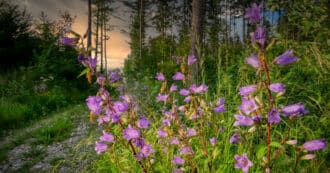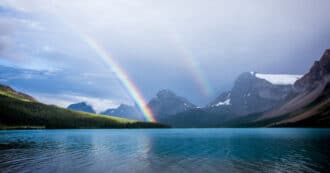The Rev. Dr. Leah D. Schade; leahschade@gmail.com
Here are ideas for reading and preaching Psalm 97 with an eye toward environmental justice and human rights, especially in a time of war. This is part of the EcoPreacher 1-2-3 series to equip pastors and congregations for engaging the Bible through an ecological lens.
Justice for Creation is justice for vulnerable peoples. When we join with Creation to proclaim God’s justice, all the Earth can celebrate! As Psalm 97 states:
1 The Lord is king! Let the earth rejoice;
let the many coastlands be glad!
2 Clouds and thick darkness are all around him;
righteousness and justice are the foundation of his throne.
Eco-Exegesis
Eco-exegesis is a method of interpreting the biblical text through a green lens using the principles of ecological theology. For this passage, we turn to Deep Calls to Deep: The Psalms in Dialogue Amid Disruption by Prof. William P. Brown of Columbia Theological Seminary (Nashville, TN: Abingdon Press, 2021).
Some interpreters throughout the ages and to this day have insisted that nature is merely a backdrop for God’s display of power. To them, Earth is nothing more than a stage upon which the salvific drama for humanity plays out. But the Psalms counter this notion. Psalm 97 (continuing from its predecessor, Psalm 96) insists that Creation actively participates in God’s enthronement. Even more, Psalm 97 describes the response of Creation to theophany, the appearance of God. The earth rejoices, and the coastlands are glad. In other words, Creation celebrates the awe-inspiring power of its Creator, even as it trembles in God’s presence.
What’s more, humanity and the rest of Creation together proclaim God’s righteousness and behold the divine glory. This is a joint effort between people and nature; the heavens preach about the justice of God, and we are able to witness the preaching by Creation itself. (See also, “God’s Creation PREACHES! Psalm 19.”)
William Brown explains, “the creator God does not limit justice to individuals or the oppressed or a people, or even all the nations. God’s justice ultimately includes the world” (319). So what does God’s justice in and for the world look like? Even more basic is the question of why Earth needs justice at all?
To answer this question, we can think about how the war in Ukraine affects the environment. NPR’s Ayesha Rascoe interviewed Carroll Muffett of the Center for International Environmental Law (CEIL) in April 2022 about the effort to bring attention to the environmental devastation of Russia’s invasion. Mr. Muffett explained, “One of the important things to understand about the environmental consequences of war is that they are human consequences in another form. And they are often difficult to discern, and they can be very long-lasting” (“How the war in Ukraine affects the environment,” April 24, 2022). In addition to the release of highly toxic substances from missile strikes on industrial areas, agricultural lands, wildlife refuges, and protected areas are impacted by mines, explosions, toxic spills, and munitions accumulations.
Just as humans suffer, so does Creation. And Creation’s suffering ultimately leads to human suffering. As Muffett explains, “when we talk about the environmental consequences of war, what we’re really talking about is simply the impacts of war on humans and on the places where they live in another more protracted and often more insidious form.”
Psalm 97 proclaims that the idolatries that prop up warring leaders will face God’s judgement. For those who are fighting to protect the vulnerable, restore the ravaged Earth, and heal the wounds of war, v. 11 assures us that “light dawns for the righteous and joy for the upright in heart.”
1. Eco-Idea
The Eco-Idea is one succinct statement that tells us who God is and/or what God does in relation to Creation and how we should respond as people of faith.
Because justice for Creation is justice for vulnerable peoples, the psalmist calls us to join with all the Earth to establish righteousness so that all may thrive in praise of God’s divine presence.
2. Eco-Questions
Eco-Questions are what we can ask to help a congregation draw out the implications of the Eco-Exegesis and Eco-Idea.
1. When was a time you experienced a theophany in nature? What was it like to feel the presence of God filling you with awe and perhaps even fear at the power you witnessed? Where were you when it happened? How did it affect your relationship with nature and with God?
2. In addition to the ways in which war devastates both the human and Earth community, what are other connections you see between environmental and human safety and health? What are ways in which your congregation can advocate for laws to – in the words of CIEL – “protect the environment, promote human rights, and ensure a just and sustainable society”?
3. Eco-Actions
Eco-Actions are ways that a congregation might respond to the Eco-Idea and Eco-Questions. One of these possibilities may have salience for your ministry context.
1. Visit CIEL’s “Get Involved” web page to join others speaking out for human rights and the environment. At the bottom of their page are a list of actions and ways to stay informed about the issues that matter to you and your congregation.
2. The Ukrainian Nature Conservation Group is working to save wildlife, forests, and rivers in the midst of war. Learn about and support their efforts at https://uncg.org.ua/en/.
3. Work with your congregational leadership to make a plan to help the environmental restoration efforts in Ukraine after the war has ceased. Infrastructure for clean water will be one of the immediate needs. Check with your denominational office about efforts to respond to the humanitarian and environmental disaster that will linger long after the missiles have stopped and the guns are silent.
* Featured image source





